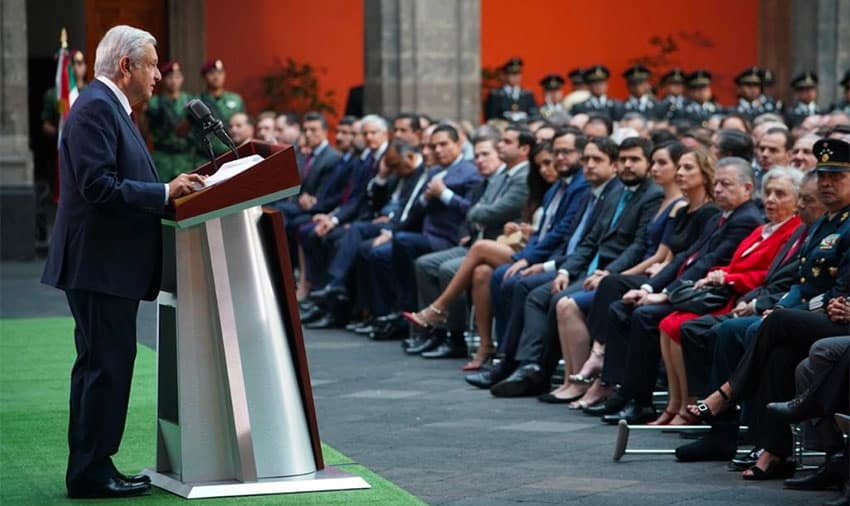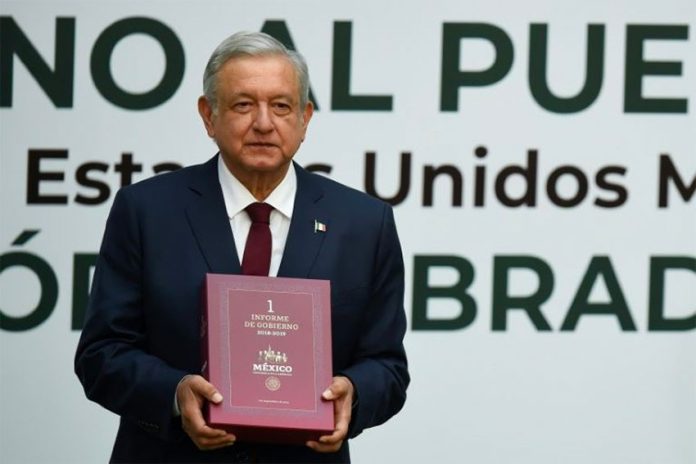President López Obrador sees progress in the transformation he has promised to bring Mexico, but cannot say the same about reducing violent crime.
The president delivered his first annual report to the nation on Sunday, asserting that the transformation “has started to become reality” but conceding that his government has not yet managed to bring down the levels of violent crime.
In an address at the National Palace, López Obrador cited austerity measures, social programs and anti-corruption actions as achievements of his administration since taking office last December.
However, he acknowledged that combating violence remains the “main challenge.” Homicide statistics for the first seven months of the year show that Mexico is on track to record its most violent year in recent history.
The president blamed policies implemented by the last two federal governments, charging that the use of military and police force to combat violence was a failure and that the consequences are still being felt today.
“The results were catastrophic . . . The strategy left a horrific toll of deaths, disappearances, wounded persons and a human rights crisis . . .” López Obrador said.
He said his government will achieve peace by attending to the root causes of violence and ensuring that there are “jobs, good salaries, well-being and that young people’s right to education and work is guaranteed.”
López Obrador also highlighted that the National Guard has now been deployed to 150 regions across the country and stressed that the armed forces have committed to guaranteeing public security without violating human rights or using excessive force.
“. . . I am a man of challenges and I am perseverant and that’s why I can say that I’m sure we will be able to calm the country; Mexico will be pacified. That’s a commitment,” he said.
The president characterized his government as an inclusive one, asserting that it “represents everyone, the rich and poor, believers and freethinkers.”
He claimed that his government has established an “authentic rule of law” and that it doesn’t – “as was the custom” – intervene in the judiciary, the Attorney General’s Office or the central bank.

He said his administration’s austerity measures have generated savings of 145 billion pesos (US $7.2 billion) in nine months, noting that officials’ salaries and benefits have been cut, “millionaire” pensions of past presidents have been cancelled and overseas trade offices have been closed.
“The luxuries, extravagances and opulence that characterized the exercise of presidential power have reached their end,” he declared.
Continuing his attack on his predecessors, the leftist president asserted that “nothing has damaged Mexico more than the dishonesty of its rulers,” adding “that’s the main cause of economic and social inequality and the insecurity and violence we suffer.”
To narrow the inequality gap, López Obrador said that his government is now providing financial support to half of all households and nine out of 10 indigenous families. The elderly, the disabled, students and farmers are all receiving greater financial support than before, he said.
The government’s youth employment scheme and tree-planting program have provided opportunities for more than one million disadvantaged people across the country, he said, and an additional 300,000 jobs were created in the first seven months of the year. The government is “rescuing the countryside from the abandonment to which it was condemned” through financial support for farmers and guaranteed prices for five agricultural products, he said.
The president noted that the minimum salary was raised by 16% at the start of the year and that petroleum production has stabilized after 14 years of decline.
López Obrador defended his government playing a greater role in the economy than that of its predecessors.
“There is still this false idea that the state shouldn’t promote development or seek to redistribute wealth but rather limit itself to creating the conditions that allow investors to do business and assume that the benefits will automatically trickle down to the rest of society. This assumption was cruelly revealed to be false during the neoliberal period,” López Obrador said.
The president reiterated that the raison d’etre of his government is “to eradicate corruption and impunity,” citing pipeline petroleum theft as one example of a scourge permitted under previous governments that is no longer tolerated.
Fuel theft has been “practically eliminated,” López Obrador said, claiming that the crime is down 94% and savings of 50 billion pesos have been generated this year. The president also said that via decree, he put an end to the cancelation of tax debt owed by large corporations.
López Obrador cited record foreign investment, low inflation and Mexico becoming the biggest trade partner of the United States this year as signs of competent economic management despite the stagnation of GDP growth.
The president claimed credit for reaching a migration deal with the United States that avoided blanket tariffs on Mexican goods that were threatened by U.S. President Donald Trump. The agreement, López Obrador said, allowed Mexico to dodge “a possible political and economic crisis.”

He also highlighted cooperation with the United States to implement development projects in the Northern Triangle of Central America so that people are not forced to migrate “because of hunger or violence.”
The president claimed that the government’s airport plan for Mexico City – upgrading the airport in the capital and Toluca and building the new Santa Lucía airport – will solve the saturation problem in three years and “save more than 100 billion pesos” in comparison with what the abandoned airport project would have cost.
The Isthmus of Tehuantepec trade corridor project will create “a transport link similar to the Panama Canal,” López Obrador charged, noting also that the government is upgrading the country’s six oil refineries, building a new one on the Tabasco coast and pursuing the Maya Train project, which “will benefit the states of Quintana Roo, Yucatán, Campeche, Tabasco and Chiapas.”
However, “the most important objective of the government,” López Obrador said, is to have “in 2024 . . . a better society. . . [in which] people are living in an environment of well-being.”
“. . . For the good of all, the poor come first,” the president added.
“Only with a just society will we achieve the rebirth of Mexico. The country will not be viable if poverty and inequality persist. It’s an ethical imperative.”
As the president gave his speech, about 1,100 people marched in protest in Mexico City, chanting “Get out, López Obrador.”
One of the organizers of the march, opposition politician Fernando Belauzaran, accused the president of lying to Mexicans in his daily 7:00am press conferences.
“He doesn’t tell the truth. It’s like a festival of mythomaniac tendencies every morning,” he told journalists.
“Andrés Manuel has deceived a lot of people who believed in him. They still haven’t realized the magnitude of the mistake they made,” protester María José Tam, a 34-year-old marketing specialist, told Agence France-Presse.
Mexico News Daily
